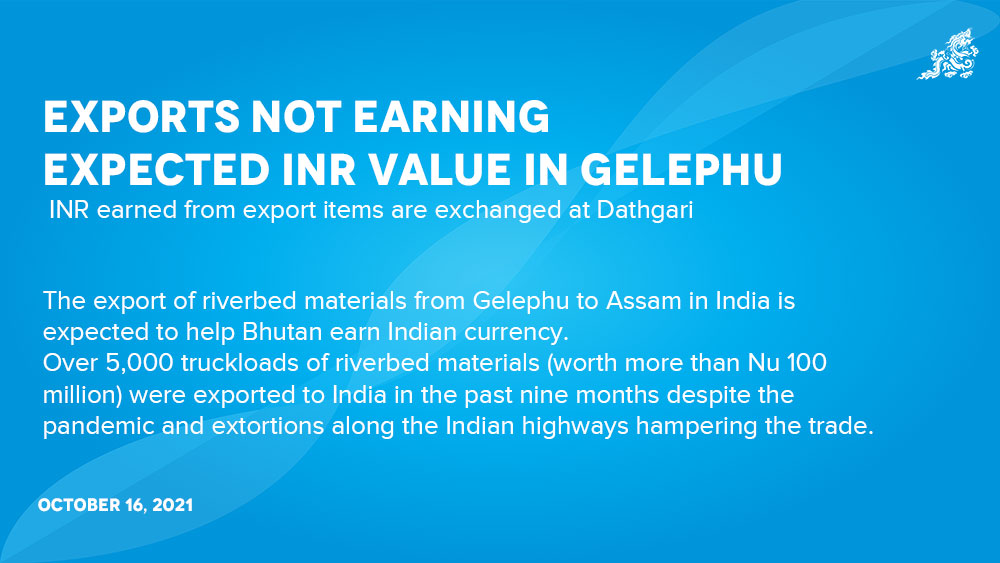INR earned from export items are exchanged at Dathgari
Nima | Gelephu
The export of riverbed materials from Gelephu to Assam in India is expected to help Bhutan earn Indian currency.
Over 5,000 truckloads of riverbed materials (worth more than Nu 100 million) were exported to India in the past nine months despite the pandemic and extortions along the Indian highways hampering the trade.
Boulders and aggregates worth Nu 116 million have been exported to India. Betelnuts worth Nu 141 million were exported between January 2020 and September 2021, according to records with the Regional Revenue and Customs Office in Gelephu.
However, INR earnings from the export items have not been reaching Bhutanese exporters, as the transactions were done in cash. The INR earned from the export are exchanged across the border and the Bhutanese exporters paid in ngultrum, according to sources.
Ngultrum has devalued by almost 12 percent at Dathgari. The importers from India and those thriving on ngultrum trade across the border work together to block incoming INR.
Sources said that the illegal trading of currency picked up in 2018 when Gelephu started exporting boulders and aggregates to India and Bangladesh.
Officials from the Bhutan Chamber for Commerce and Industry (BCCI) in Gelephu said that there is a risk of counterfeit notes entering the country with cash payments and devaluation continuing unabated.
The BCCI Regional Secretary, Kelzang, said that this type of illegal business thrives when there is not enough INR held in supply for import and export trade.
“We need an RMA regional office here. It would also cater to six central dzongkhags. There are people exiting via Gelephu for health, studies, and pilgrimage,” he said.
He added that the export transactions from Gelephu have increased by more than twofold after the export of riverbed materials began in 2018.
“The INR-earning opportunities from export are huge now. We need to have facilities in place. The risk of counterfeit money entering our country and devaluation of the currency can be stopped. We need to encourage online payment transactions,” said Kelzang.
Officials said that people preferred buying INR from across the border when it is not readily available here. “Exporters can earn INR themselves. We need to promote payment transactions online,” said an official.
Two officials from the Royal Monetary Authority studied the need to set up a regional office in Gelephu in 2018.
The Bank of Bhutan provides Rs 15,000 for exporters after the exporters produce the required documents, which is mainly meant to meet transportation expenses.
A programme officer with Bhutan Export Association (BEA) in Gelephu, Guru Wangchuk, said that they removed the cash-quarantine box at the border gate after currency devaluation. “Now they are forced to do all payment transactions online. No transactions related to exports are done in cash.”
He added that the number of people doing export business from Gelephu has increased. “It takes time when applying for INR through banks.”
Exporter Raju Upreti said the shortage of INR is the main reason behind currency devaluation. “The main players are traders who receive payment partially from the bank and partially in cash. The illegal trading of currency devalues our currency. The practice also accelerates fronting.”
He added that transactions for incoming currency should be done through RTGS or other banking tools.
“However, exporters receive cash and it’s exchanged with the commission, which is extra income for exporters. This practice should be stopped,” said Raju Upreti.
Edited by Jigme Wangchuk


